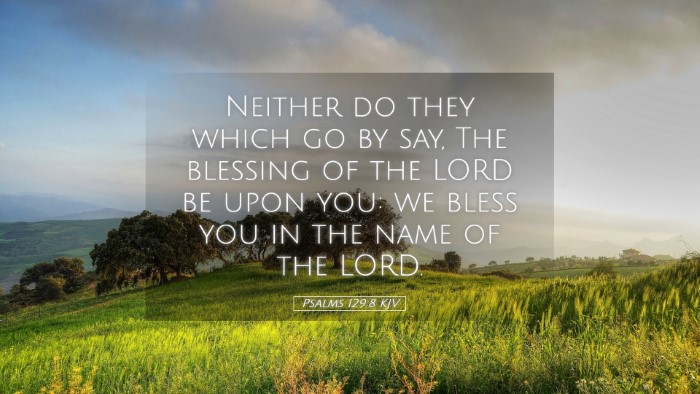Psalms 129:8 Commentary
Bible Verse: "Neither do they which go by say, The blessing of the LORD be upon you: we bless you in the name of the LORD."
Introduction
Psalms 129 presents a scene of distress combined with resilience. This psalm is a communal lament that reflects the struggles of Israel’s people, addressing their suffering at the hands of their enemies. Verse 8 encapsulates a stark contrast between blessing and curse, particularly focusing on the absence of benevolence in the face of their trials.
Contextual Background
Understanding the historical context of this verse requires a look at the broader narrative of the Psalms, where the poet often expresses communal anguish resulting from oppression and persecution. The psalm likely reflects later periods of Israel’s history, including the Babylonian exile and other times of suffering.
Exegetical Insights
The verse articulates a poignant realization: the lack of affirmations of God's blessing amidst adversity. Here, the psalmist implies a qualitative measure of suffering by contrasting it with a promise of divine favor that is seemingly absent.
The use of the phrase "they which go by" signifies travelers or passersby, who typically would offer blessings to one another in biblical culture. This absence of blessing in dire circumstances underscores a profound sense of alienation.
Commentary from Matthew Henry
Matthew Henry elucidates that this verse signifies the scorn and derision faced by the Jewish people. He notes how the utter absence of blessings reflects not just societal neglect but more profoundly, a symbolic representation of Israel's estrangement from God's favor during times of persecution. He emphasizes the significance of communal support and how this absence leads to a deepened sense of despair.
Commentary from Albert Barnes
Albert Barnes interprets this verse as an indicator of disgrace amongst people. He states that the absence of blessings from bystanders suggests that the sufferings of God’s people are so pervasive that even the usual courtesies become extinct. Barnes points out the ethical implications of this absence, highlighting that blessings are not merely ceremonial but are vital for mutual encouragement.
Commentary from Adam Clarke
Adam Clarke presents a theological reflection, indicating that blessings in ancient Israel often tied directly to divine favor. The lack of spontaneous blessings in this verse can be seen as a divine judgment and a reflection on the moral failings of the surrounding community. Clarke notes that such a situation casts a shadow on the community's conscience and calls them to introspection.
Theological Reflection
The neglect of blessing emphasizes not only the physical suffering of the oppressed but their spiritual desolation as well. This neglect of basic courtesy serves a dual purpose: it reveals the isolation faced by those suffering and also acts as a call to the observing community. It challenges believers to consider their role in extending blessings, particularly to those enduring hardships.
This verse prompts vital questions for both individual and communal reflections—how often do we engage in blessing those who suffer? Do we recognize the weight of our words and the spiritual and emotional sustenance they provide to others?
Implications for Ministry
For pastors and church leaders, Psalms 129:8 serves as a powerful reminder of the importance of fostering a culture of blessing within the church community. It is imperative to create supportive environments where each member feels encouraged and valued.
- Encouragement in Times of Distress: Church leaders are called to actively provide prayer and blessings, recognizing the spiritual warfare that may afflict their congregants.
- Awareness of Social Justice: An understanding of this verse can prompt engagement in social justice, ensuring that those marginalized are given a voice and are blessed in their struggles.
- Community Building: Fostering relationships that go beyond mere rituals to heartfelt interactions can bolster the faith of members during trying times.
Conclusion
Psalms 129:8 shines a light on the spiritual journeys of individuals, echoing the need for compassion and connection in the face of adversity. By reflecting on the insights from Henry, Barnes, and Clarke, we are encouraged not only to recognize the significance of our blessings but also the deep communal responsibility we share in ensuring that no one feels the profound absence of kindness.
As we engage with this text, may we inspire a movement that continually elevates the practice of blessing one another—thus embodying the very heart of Christian fellowship.


